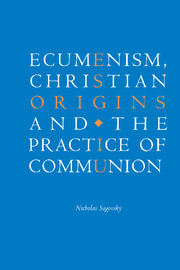Book contents
- Frontmatter
- Contents
- Acknowledgements
- List of abbreviations
- 1 The common life
- 2 Communion: Anglicans, Roman Catholics, and ecumenical consensus
- 3 Plato's vision
- 4 Aristotle's revisionism
- 5 Covenant and community
- 6 Little communities and the Catholic church
- 7 Cappadocian koinonia
- 8 Augustine and the story of communion
- 9 Ecumenism and the practice of communion
- Select biblography
- Index
8 - Augustine and the story of communion
Published online by Cambridge University Press: 22 September 2009
- Frontmatter
- Contents
- Acknowledgements
- List of abbreviations
- 1 The common life
- 2 Communion: Anglicans, Roman Catholics, and ecumenical consensus
- 3 Plato's vision
- 4 Aristotle's revisionism
- 5 Covenant and community
- 6 Little communities and the Catholic church
- 7 Cappadocian koinonia
- 8 Augustine and the story of communion
- 9 Ecumenism and the practice of communion
- Select biblography
- Index
Summary
The full and committed acceptance of Catholic Christianity by Augustine, who was baptised by Ambrose, Bishop of Milan, on Easter Eve 387, was one of the defining moments of western culture. Augustine, more than any other thinker, has been the shaping genius of western self-understanding. He developed and moulded a ‘grand narrative’ of and for humanity with which we are still overwhelmingly engaged. It was a narrative that made sense of his own experience and the experience of the Church in history and which, through the ideological power of the Christian tradition for more than fifteen hundred years, imposed much of that sense on others.
Our task is to investigate the contribution made by Augustine to the developing understanding within the Christian tradition of all that is suggested by the Greek term koinonia. Greek did not come easily to Augustine. His knowledge of Platonist writings, which profoundly influenced his theological understanding, was a knowledge acquired through writers like Marius Victorinus, who translated from Greek into Latin. In Augustine, we observe a critical moment in the development of a western, Latin tradition of theological reflection on the common life. A full account of this development would attend to the history of the church in Rome, in Gaul, and in North Africa as the context of the writings of Irenaeus, who bridges the traditions of east and west, Tertullian, and Cyprian, but Augustine towers above all his predecessors as the synthetic genius who gave to western theology its abiding structure and themes.
- Type
- Chapter
- Information
- Ecumenism, Christian Origins and the Practice of Communion , pp. 171 - 193Publisher: Cambridge University PressPrint publication year: 2000



